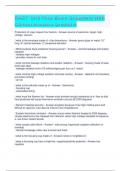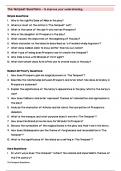Production of xrays require four factors - Answer-source of electrons, target, high-
voltage, vacuum
/.what is the envelope made of + the dimensions - Answer-pyrex glass or metal, 10''
long, 6'' central diameter, 2'' peripheral diameter
/.What purpose does protective housing serve? - Answer-- controls leakage and scatter
radiation
- isolates high voltages
- provides means to cool tube
/.what controls leakage radiation and scatter radiation - Answer-- housing made of lead-
lined cast steel
- leakage radiation limit (100 milliroentgens per hour at 1 meter)
/.what controls high-voltage isolation and tube cooling - Answer-- dielectric oil (insulates,
promotes cooling)
- air fan
/.what is the cathode made up of - Answer-- filament(s)
- focusing cup
- associated wiring
/.what must the filament do - Answer-must provide enough resistance to e- flow so that
heat produced will cause thermionic emission (occurs @ 2200 degrees)
/.filament material and why - Answer-tungsten because it has high melting point and
difficult to vaporize. Can also be rhenium and molybdenum.
/.Explain thermionic emission - Answer-occurs when filament heated at 2200 degrees,
causes electrons to be released from filament. when high voltage released at exposure,
e- are driven toward anode
/.what causes tube failure - Answer-- tube arcing (vaporized tungsten collection on
envelop)
- filament breakage (often due to boost and hold)
/.what is the focusing cup made of - Answer-nickel or molybdenum
/.does a focusing cup have a high/low, negative/postivite potential - Answer-low
negative
,/.what is the mA for space charge effect - Answer-maximum mA is 1000-1200
/.three functions of anode assembly - Answer-- target surface
- conducts high voltage
- serves as primary thermal conductor
/.components of rotating anode assembly - Answer-- anode
- stator
- rotor
/.Description of stator - Answer-located outside envelope, is a bank of electromagnets
/.description of rotor - Answer-- is a copper cylinder connected to an anode disk by a
molybdenum stem.
- It turns when the stator is energized.
- contains ball bearings.
/.at what speed does the rotor turn at - Answer-- 3200-3600 rpm
- 10000-20000 rpm high speed anodes
/.what is the rotating anode made of and why - Answer-tungsten-rhenium alloy, because
it has high atomic number, high melting point, has heat conducting ability
/.what temperature does the focal track get to - Answer-reaches 1000-2000 degrees in
normal use
/.what is the anode backed with and why is it backed - Answer-molybdenum and/or
graphite. backing assists with heat loading
/.warmup procedure of anode benefits - Answer-prevents cracking, helps maintain
vacuum, stress relieved anode
/.what is target area and what areas - Answer-portion of anode that electron stream
contacts, point source of xray photons
- target, focus, focal point, focal spot, focal track
/.is a large or small focal spot better for life of anode - Answer-large focal spot is better
for life of anode
/.what size focal spot is required for image quality - Answer-small focal spot
/.What is the line focus principle? - Answer-by using a small anode angle you can
change the size of the effective focal spot (make it smaller for better resolution) without
increasing the heat and damaging the anode.
, /.what is effective focal spot controlled by - Answer-actual focal spot and target angle
/.what are the diagnostic ranges - Answer-10-1200 mA
0.001 to 10 seconds
30-150 kVp
/.description of xray table - Answer-uniform, radiolucent surface, easy to clean, no
crevices that could collect contrast media, contains bucky/IR
/.what are the different tube supports - Answer-- overhead
- floor
- floor to ceiling
- mobile
- c-arm
/.what are the uses of upright units - Answer-chest, abdomen, AC joints, cervical spine
/.how is shock hazard minimized from the high-voltage cables - Answer-1. insulation
2. grounded wire sheath
3. secondary side of high voltage transformer is grounded
/.what can be selected on operating console - Answer-power on/off, kV, mA, time, exam
(hand, hip,etc.), AEC chambers, detector being used, focal spot size, view worklist
/.exposure switch description - Answer-deadman switch, pressing halfway down starts
rotor and filament boost circuit, depress in one motion to maximize tube life
/.how long do moblie xray unit cord need to be - Answer-mobile xray exposure switch
requires 3-meter cord
/.what does the generator do - Answer-- supplies electrical power to xray tube (high
voltage b/w anode and cathode, filament voltage/current)
- controls exposure timing (turns exposure on and off, high voltage switched on and off)
/.what does the main xray circuit contain - Answer-exposure switch, timer circuit
/.incoming line current description - Answer-- 60 Hz alternating current (mains
supply/incoming line current; 3-phase)
- 120 V
- will be converted to high voltage and to high current in different parts of the xray circuit
/.line compensation description - Answer-- most imaging systems operate on 220 V
(some 110 or 440)
- incoming power is not always accurate
/.transformer description - Answer-- principle components of xray generators





